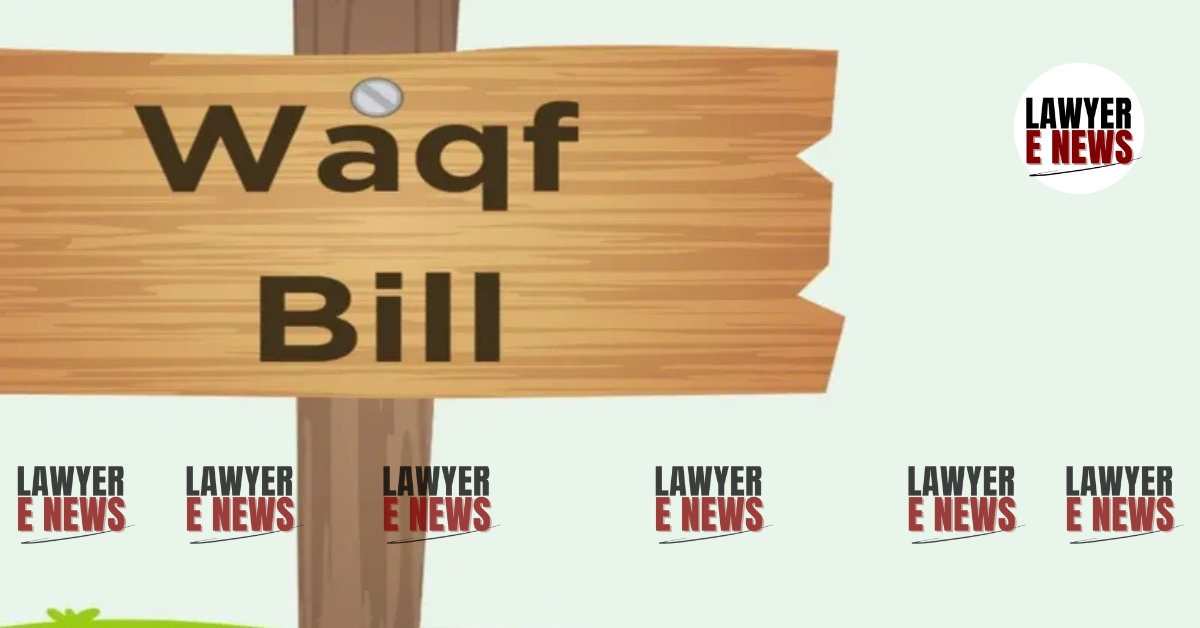-
by sayum
17 February 2026 8:32 AM



“No Legal Basis to Retain Waqf Board Seat After Losing Bar Council Position” – In a crucial ruling Supreme Court of India held that a Muslim member of a State Bar Council, once appointed to a Waqf Board under Section 14(1)(b)(iii) of the Wakf Act, 1995, ceases to hold such office upon losing their position in the Bar Council. The Court overturned the judgment of the Division Bench of the High Court of Manipur, which had interpreted Explanation II to Section 14 as inapplicable to members from the Bar Council category, thereby allowing a former member to continue on the Board.
The Supreme Court's decision restores clarity on the co-terminus nature of Waqf Board membership and the original qualifying position, ensuring legislative intent is preserved.
The appellant, Md. Firoz Ahmad Khalid, a Muslim lawyer, was elected to the Bar Council of Manipur in December 2022. On February 8, 2023, he was appointed to the 7th Waqf Board Committee of Manipur by the State Government, replacing Respondent No. 3, who had ceased to be a member of the Bar Council after losing the council election.
Respondent No. 3 challenged this replacement in a writ petition, arguing that Explanation II to Section 14(1)(b) of the Wakf Act applied only to Members of Parliament and State Legislatures, not Bar Council members. The High Court accepted this argument and reinstated Respondent No. 3 to the Board.
Supreme Court’s Observations on Interpretation of Section 14 of the Wakf Act
Rejecting the High Court's interpretation, the Supreme Court emphasized that: “The eligibility of persons under Section 14(1)(b)(i) to (iii) hinges on their membership in either Parliament, the State Legislature, or the Bar Council respectively. Without such membership, the very basis for their position on the Board ceases to exist.”
The Court observed that Explanation II must be read in light of the entire scheme of Section 14, including its provisos and purpose, and not in isolation.
It held: “Although Explanation II does not specifically mention the Bar Council, its clarificatory nature must be understood to extend implicitly to all categories under Section 14(1)(b). To exclude Muslim Members of the Bar Council would be contrary to legislative intent and constitutional principles of reasonable classification.”
The Court criticized the High Court's restrictive reading:
“The Division Bench failed to appreciate that the Explanation, although silent on Bar Council members, is not exhaustive but illustrative. Its purpose is to clarify—not to limit—the operation of the main provision.”
Doctrine of Co-Terminus and Purposeful Interpretation
The judgment is rooted in a purposive reading of the Wakf Act:
“A right accrued by virtue of a qualification—such as being a member of the Bar Council—ceases when that qualification lapses. It would be illogical to suggest that one can continue to hold office on a Board when the basis for that appointment no longer exists.”
The Court rejected the application of the Latin maxim expressio unius est exclusio alterius, stating:
“Applying the maxim would defeat legislative purpose. It cannot be used to override clear textual and contextual interpretation aimed at achieving harmony in the statute.”
Quoting Shailesh Dhairyawan v. Mohan Balkrishna Lulla, (2016) 3 SCC 619, the Court reaffirmed:
“The principle of purposive interpretation demands that a statute be interpreted to serve the purpose it was designed to fulfil—not to frustrate it through narrow textual reading.”
Concluding that the High Court's reasoning was flawed and the reinstatement of Respondent No. 3 was legally untenable, the Supreme Court ruled:
“The impugned judgment stands set aside. The appointment of the appellant, a validly elected Muslim Member of the Bar Council, is upheld.”
Accordingly, the judgment of the Single Judge dismissing the earlier writ petition was restored.
This ruling reinforces the principle that membership in bodies like the Waqf Board, granted based on institutional affiliation, must automatically end with the expiration of that affiliation. It also affirms that explanatory provisions in statutes are meant to clarify, not to create artificial distinctions that defy logic or intent.
“A provision must be read as a whole, and an explanation cannot be allowed to overshadow or distort the clear scheme of the main statute.”
Date of Decision: April 22, 2025
